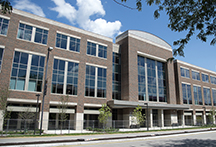Purdue's Wang Hall receives gold for going 'green'
July 29, 2015
 |
|
Seng-Liang Wang Hall is just north of the Northwestern Avenue Parking Garage. It is designed primarily to provide laboratories, offices, conference rooms and support facilities for the School of Electrical and Computer Engineering. (Purdue University/Mark Simons) |
WEST LAFAYETTE, Ind. – Purdue University's Seng-Liang Wang Hall received a gold level certification from the Leadership in Energy and Environmental Design, or LEED, organization, recognizing Wang Hall's best-in-class "green" building strategies and practices.
Wang Hall is a four-story, 147,000-square-foot building at 516 Northwestern Avenue, across from the Purdue Mall and next to the Northwestern Avenue parking garage. The $39 million mixed-use facility combines public and private uses based on a partnership among Purdue, Purdue Research Foundation, Browning Investments LLC and the City of West Lafayette. The Purdue Research Foundation leases 91 percent of the space to University as part of a strategic plan to grow faculty, undergraduate and graduate enrollment. Private uses of the building include space for the Purdue Federal Credit Union and two restaurants.
The building received a gold certification in their submitted category for core and shell development of the facility. Gold certification is the second highest certification that submissions can receive.
Greg Napier, director of Purdue Research Park network and physical facilities and a registered landscape architect, said the building was rated on a range of categories which earned them the gold certification.
"We submitted a LEED application to the core and shell development for building design and construction projects rating system. This is a class for projects where the developer controls the design and construction of the entire mechanical, electrical, plumbing and fire protection system," he said. "We were rated on things like sustainability, water efficiency, energy and atmosphere, materials and resources, indoor environmental quality, innovation in design and regional priority credits."
Environmentally friendly construction designs that led to the award include:
* Practices that diverted over 82 percent of construction waste from being sent to landfills.
* Sub-metered electricity, water and natural gas for all tenants.
* Thermal energy meters to allow each tenant to understand their portion of the utility use and make adjustments to reduce use on a go forward basis.
* Potable water and waste water plumbing fixtures that reduce demand for potable water by more than 38 percent, or over 320,000 gallons per year.
* Storm water units and underground infiltration systems that took 85 percent of the total suspended solids from the site and removed them from incoming storm water.
* Pedestrian oriented hardscape and vegetated open space occupying over 40 percent of the total site area.
* 100 percent of regularly occupied areas having access to exterior views.
"The Wang Hall building is unique for West Lafayette because of where it is situated, its design and its use for the university and the public," said John Dennis, West Lafayette mayor. "When it opened last year it was close to being fully occupied, which is unusual for a building of this type. Add the environmentally friendly aspects of the building and it takes the facility to a whole new level."
Napier said all partners in the development team incorporated a variety of design elements that aligned with Purdue Research Foundation's planning in the design, construction and operation of buildings and their function in communities.
Indianapolis-based Browning submitted the application to LEED for the award.
"There were so many different planning and construction elements in the design of Wang Hall to make it a truly environmentally friendly building, and we could not be happier with the end result," said John Hirschman, president and CEO of Browning. "It is a great bonus to have it recognized by a prestigious organization like LEED."
About Purdue Research Foundation
The Purdue Research Foundation is a private, nonprofit foundation created to advance the mission of Purdue University. Established in 1930, the foundation accepts gifts; administers trusts; funds scholarships and grants; acquires property; protects Purdue's intellectual property; and promotes entrepreneurial activities on behalf of Purdue. The foundation manages the Purdue Foundry, Purdue Office of Technology Commercialization, Purdue Research Park and Purdue Technology Centers. The foundation received the 2014 Incubator Network of the Year by the National Business Incubation Association for its work in entrepreneurship. For more information about funding and investment opportunities in startups based on a Purdue innovation, contact the Purdue Foundry at foundry@prf.org
About Browning Investments LLC
Browning has been engaged in the acquisition, ownership, development, construction, leasing, management and disposition of investment real estate properties since 1977. The company arranges project financing using equity capital from internal sources, private placements and joint venture relationships, along with mortgage financing from a variety of major institutions around the country including banks, insurance companies and pension funds. The company is comprised of a core group of experienced real estate professionals with extensive and varied experience in the commercial real estate industry.
Writer: Hillary Henry, Purdue Research Foundation
Purdue Research Foundation contact: Cynthia Sequin, 765-588-3340, casequin@prf.org
Source: Greg Napier, 765-588-3461, gsnapier@prf.org

